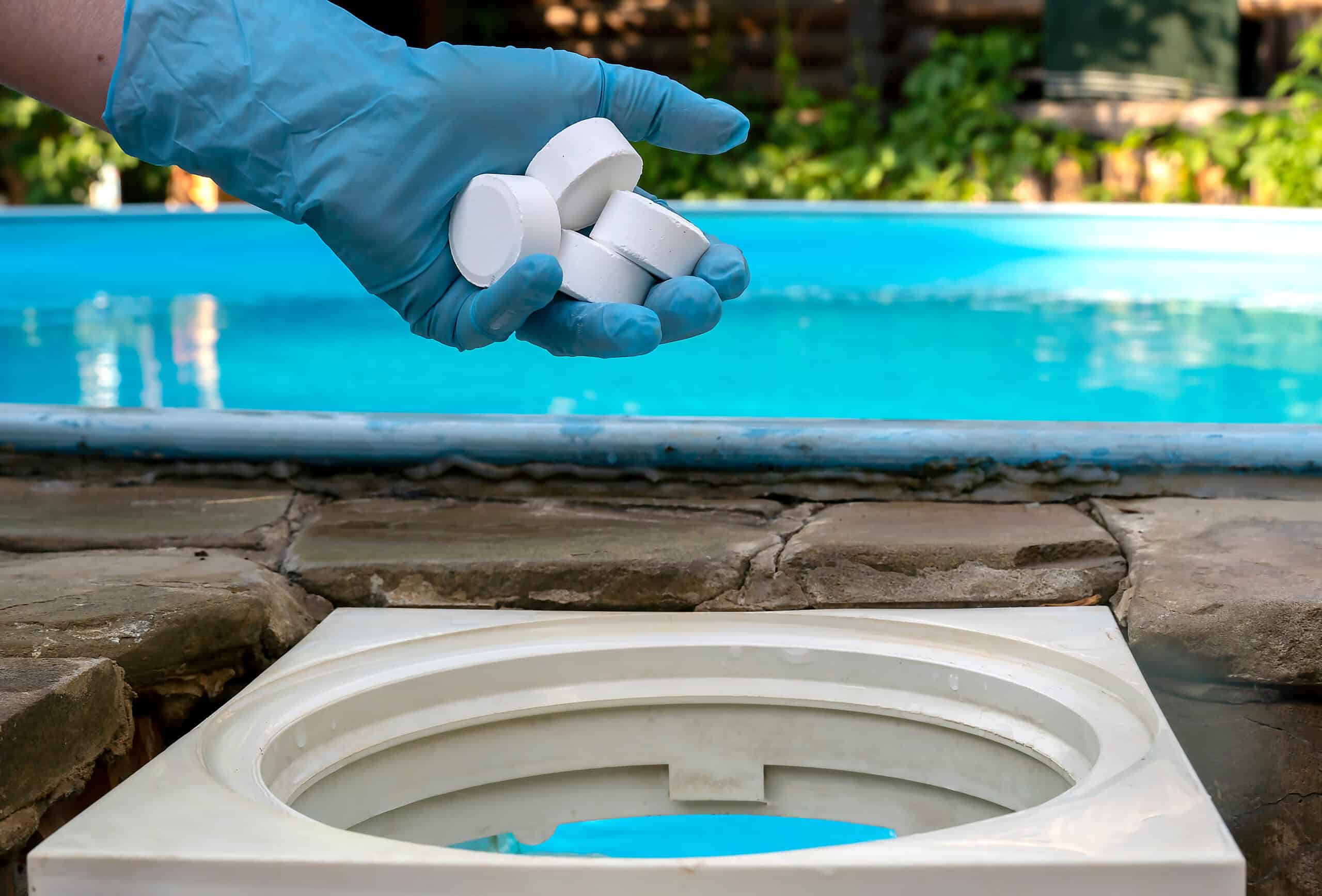A salt water pool is a chlorinated pool but the chlorine is produced, not chemically added.
For the most part….
You will need to manually add chemical chlorine to your salt water pool at certain times when the salt chlorinator isn’t powerful enough to keep up with demand. It’s important to note that salt water pools are chlorine pools but produce most of the required chlorine itself.
Don’t believe what you (sometimes) read online: You will need to have some chemical chlorine on hand if you own a salt water pool, especially if you close the pool for winter and have to open it again in the spring.
Below we’ll discuss how the chlorinator works and why you will probably need to add a bit of chemical chlorine from time to time.
When do you add chlorine to a salt water pool?
The salt chlorinator is usually able to produce enough chlorine to keep the pool sanitized on its own. There are times however where the chlorinator can’t produce chlorine quickly enough to satisfy the needs of the pool.
These times include:
- When you open the pool in the spring and there is 0 free chlorine available.
- Prior to heavy pool usage such as a pool party.
- During very hot, sunny weather which quickly kills chlorine.
- After a heavy rainfall which can quickly dilute the free chlorine level in the water.
- When you close the pool in the autumn and want a bump of chlorine to ward off algae after chlorine production ceases for the winter.
When you open your pool in the spring, it will undoubtedly have 0 chlorine showing. There won’t be any chlorine in the water whatsoever. If you turn your chlorinator on and expect it to quickly get to the desired range of 1 ppm – 3 ppm chlorine, it won’t happen.
Also, if the water temperature is too low early in the spring, the chlorinator won’t start up. Chlorinators are designed to shut off chlorine production when water temperature drops below a certain level.
Plus, the best and highest capacity chlorinators can produce up to 1.47 lbs of chlorine per day and that’s if you run them 24/7. You’d wear out the salt cell in a few weeks if you ran it that frequently.
Instead, you’re going to need to add chemical chlorine to quickly get chlorine up to at least 1 ppm or so and then the chlorinator can be turned on to maintain that level.
Check out my article called Should I Use The Super Chlorinate Feature? (Answered) to learn more about how long your salt cell may last and how using it too much wears it out sooner than you might like.
What does the salt do in your pool if you still need to add chlorine?
Some people wonder about why you would buy a salt chlorinator at great cost to you and still have to occasionally use chemical chlorine on top of that in your salt water pool.
A salt water pool uses a salt chlorination system to produce chlorine from dissolved salt. Salt on its own does nothing. It requires a chlorination system to convert the salt to chlorine using a process called electrolysis.
Salt gets dissolved in the pool water and when it is charged with a low voltage inside the salt cell that is part of the chlorination system, it produces chlorine. The “problem” is that the chlorinator is really only good at producing a slow but steady amount of chlorine rather than delivering a large amount in a short period of time.
So you use chemical chlorine from time to time to shock the pool water and quickly raise the chlorine level and then the chlorinator works to maintain the proper chlorine level moving forward with a target of 1 part per million (ppm) to 3 ppm as the ideal range.
Chemical chlorine helps to quickly raise chlorine levels. The salt chlorinator is best used to maintain the level of chlorine for day to day swimming.
Can you add bromine to a salt water pool?
Don’t add bromine to your salt water pool in place of chlorine. Your salt water pool already has chlorine so there is no point in switching to another chemical like bromine.
Also, chlorine is easier to find, there are more product options to choose from (shock powder, crystal form, liquid and puck form) and chlorine is usually much cheaper than bromine, probably half the price.
Chlorine can be added manually whereas bromine typically needs to be added through an automated system of some kind, which you’d have to purchase separately.
I’ve written a more detailed article on bromine usage that sheds more light on bromine vs chlorine and the pros and cons of each chemical.
Bottom line: Avoid bromine for your salt water pool. Stick with chemical chlorine when you need a chemical bump to shock the pool.


